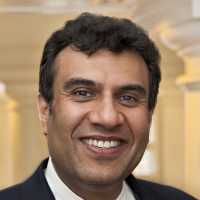
19 Mar New HeartMate 3 LAVD Reduces Risk of Strokes and Clots
MedicalResearch.com Interview with:
Mandeep R. Mehra, MD, MSc, FRCP (London)
The William Harvey Distinguished Chair in Advanced Cardiovascular Medicine
Medical Director, Heart and Vascular Center
Brigham and Women’s Hospital
Executive Director
Center for Advanced Heart Disease
Brigham and Women’s Hospital
Professor of Medicine, Harvard Medical School
MedicalResearch.com: What is the background for this study? What are the main findings?
Response: The MOMENTUM 3 trial is the largest study of LVAD therapy in Advanced Heart Failure with over 1000 randomized patients followed to at least 2 years. This trial tested a novel fully magnetically levitated LVAD, the HeartMate 3 pump against a mechanical bearing containing LVAD, the HeartMate II pump in patients suffering from advanced heart failure (85% of whom were on continuous intravenous Inotropic therapy or IABP device at the time of randomization). While LVADs have improved survival for such patients, the morbidity has remained excessive due to serious complication as a result of problems with hemocompatibility.
The principal concerns revolve around complications of pump thrombosis requiring surgical replacement, strokes and bleeding events, especially gastrointestinal bleeding. The trial has previously reported two interim analyses which suggested signals for superiority on pump replacement and even a decrease in ischemic stroke.
This final full report concludes convincingly that all three domains of hemocompatibility related adverse events are reduced with the novel LVAD with near elimination of pump thrombosis, halving of strokes of any kind and any severity and a marked decrease in bleeding complications.
MedicalResearch.com: What should readers take away from your report?
Response: The novel HeartMate 3 pump is superior to the HeartMate II pump and the magnitude of benefit is large with a Number Needed to Treat (NNT) of <1. Thus, for every 100 patients where a clinician chooses to use the HeartMate 3 pump, 22 episodes of pump thrombosis are avoided, 20 less strokes are encountered and 68 fewer episodes of bleeding events occur (of which 36 gastrointestinal bleeding events are prevented). These benefits are seen across the spectrum of age, sex, race, severity of baseline illness or intended therapeutic trajectory of either bridge to transplant or destination lifetime therapy.
These results suggest that we now have a more forgiving LVAD which should open doors to greater referrals to specialized centers for consideration of LVAD therapy.
MedicalResearch.com: What recommendations do you have for future research as a result of this work?
Response: While the MOMENTUM 3 trial represents the introduction of a new era in LVAD therapy, we still need to work on reducing complications related to infection by focusing research on fully internalizing the parts of the pump such as the driveline which exit the body to be connected to sources in order to power the pump mechanisms.
Disclosures:
Dr. Mehra reports consulting fees from Abbott, Medtronic, NupulseCV, FineHeart, Janssen, Portola, Mesoblast,
Citation:
This article was published on March 17, 2019, at NEJM.org.
[wysija_form id=”3″]
[last-modified]
The information on MedicalResearch.com is provided for educational purposes only, and is in no way intended to diagnose, cure, or treat any medical or other condition. Always seek the advice of your physician or other qualified health and ask your doctor any questions you may have regarding a medical condition. In addition to all other limitations and disclaimers in this agreement, service provider and its third party providers disclaim any liability or loss in connection with the content provided on this website.
Last Updated on March 19, 2019 by Marie Benz MD FAAD
